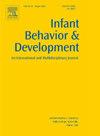The effect of telephone-assisted breastfeeding monitoring on physiological jaundice, exclusive breastfeeding in the first six months, development of colic, and breastfeeding self-efficacy: A randomized controlled trial
IF 1.9
3区 心理学
Q3 PSYCHOLOGY, DEVELOPMENTAL
引用次数: 0
Abstract
This randomized controlled study was conducted to evaluate the effects of telephone-assisted breastfeeding monitoring on physiological jaundice, exclusive breastfeeding in the first six months, colic, breastfeeding success, and breastfeeding self-efficacy. Breastfeeding and infant care training were given to pregnant women by video calls (N = 54). Video call counseling was provided to the mothers in the intervention group (n = 27) every day for the first week after discharge and weekly until the 24th week, and the control group (n = 27) was only telephone called in follow-up weeks. The primary variables were exclusive breastfeeding and breastfeeding success, while secondary variables were physiological jaundice, colic, and breastfeeding self-efficacy. The LATCH Breastfeeding Assessment Tool, the Breastfeeding Self-Efficacy Scale, and the Infantile Colic Scale were used. The mean scores of the intervention and control groups were compared using the Mann-Whitney U test and multivariate analysis of variance in repeated measurements. The telephone-assisted breastfeeding monitoring increased exclusive breastfeeding in the first six months. Physiological jaundice was experienced less in infants in the intervention group. There was no difference in terms of infantile colic, breastfeeding success, and breastfeeding self-efficacy between group and group*time interaction, a difference was found in terms of time. The telephone-assisted breastfeeding monitoring can be used to increase exclusive breastfeeding and prevent physiological jaundice (ClinicalTrials.gov Identifier: NCTXXX).
电话辅助母乳喂养监测对生理性黄疸、头六个月纯母乳喂养、肠绞痛发展和母乳喂养自我效能的影响:随机对照试验。
本随机对照研究旨在评估电话辅助母乳喂养监测对生理性黄疸、前六个月纯母乳喂养、肠绞痛、母乳喂养成功率和母乳喂养自我效能的影响。通过视频电话对孕妇进行母乳喂养和婴儿护理培训(N = 54)。干预组(n = 27)在出院后第一周每天进行一次视频电话咨询,直到第24周每周进行一次,对照组(n = 27)在随访周只进行电话咨询。主要变量为纯母乳喂养和母乳喂养成功,次要变量为生理性黄疸、绞痛和母乳喂养自我效能感。采用LATCH母乳喂养评估工具、母乳喂养自我效能量表和婴儿绞痛量表。采用Mann-Whitney U检验和重复测量的多变量方差分析比较干预组和对照组的平均得分。电话辅助母乳喂养监测增加了前六个月的纯母乳喂养。干预组婴儿出现生理性黄疸较少。在婴儿绞痛、母乳喂养成功率和母乳喂养自我效能感方面,组与组*时间互动没有差异,但在时间方面存在差异。电话辅助母乳喂养监测可用于增加纯母乳喂养和预防生理性黄疸(ClinicalTrials.gov标识:NCTXXX)。
本文章由计算机程序翻译,如有差异,请以英文原文为准。
求助全文
约1分钟内获得全文
求助全文
来源期刊

Infant Behavior & Development
PSYCHOLOGY, DEVELOPMENTAL-
CiteScore
4.10
自引率
4.80%
发文量
94
期刊介绍:
Infant Behavior & Development publishes empirical (fundamental and clinical), theoretical, methodological and review papers. Brief reports dealing with behavioral development during infancy (up to 3 years) will also be considered. Papers of an inter- and multidisciplinary nature, for example neuroscience, non-linear dynamics and modelling approaches, are particularly encouraged. Areas covered by the journal include cognitive development, emotional development, perception, perception-action coupling, motor development and socialisation.
 求助内容:
求助内容: 应助结果提醒方式:
应助结果提醒方式:


